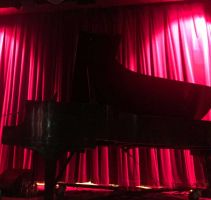 What does a world class pianist do when his heavy metal band Dream Theater is not making records or touring...? In addition to creating his own iOS products, and serving as Artist-in-Residence at the Center for Computer Music and Acoustics (CCRMA) at Stanford University in California, he is now performing Bach to Rock, a series of extremely entertaining, and autobiographical solo acoustic piano concerts. The performances draw from his lifetime as a creative improviser at the peak of the instrument's craft.
What does a world class pianist do when his heavy metal band Dream Theater is not making records or touring...? In addition to creating his own iOS products, and serving as Artist-in-Residence at the Center for Computer Music and Acoustics (CCRMA) at Stanford University in California, he is now performing Bach to Rock, a series of extremely entertaining, and autobiographical solo acoustic piano concerts. The performances draw from his lifetime as a creative improviser at the peak of the instrument's craft.
I have had the privilege of interviewing Jordan on more than one occasion. I am always impressed with his supreme confidence in his abilities as a musician and improvisor, but also his humility and understanding of where music and life intersect.
You obviously have gifts for music, but at some point in your life, you must have also practiced your butt off. What were you doing when you weren't practicing? Did that have any effect on where you're at now with your technology products?
That's a good question, because when I was a kid, I was going to the Juilliard School and it was extremely demanding. There wasn't a whole lot of other stuff going on. It was practicing and eating and sleeping.
How old were you when you went there?
I started there when I was 9. I was going to school where other 9-year olds there were writing operas. It was the pre-college division. I went to regular school until 11th grade and then for 11th and 12th grade I went to an experimental school that allowed me to do whatever I wanted. It was very open. My mother would drive me into the city twice a week, and then I'd have composition lessons.
It would have to be a serious passion to work that hard at a young age...
Yea, totally. I was all about it. I found something that I was good at, and an element outside of classical music, which was that I could improvise on what I was playing. I didn't even realize in those days that being able to look at a guitar or lead sheet and being able to play it was something useful. You know, you see the C chord and the melody notes and that'd be enough information for me to play whatever came into my head. I found out later on that not everybody does that.
When did you start to see beyond the classical influence?
I was strictly classical until I started listening to rock when I was 16 or 17 and I heard Keith Emerson. It was the day that somebody brought over Emerson, Lake, and Palmer's Tarkus that I was like, "Oh my god. This is unbelievable." The power of the keyboard in this kind of context. So, I'd bring the other Julliard kids in, close the door and play some Boogie Woogie, or blues, or Genesis and Gentle Giant and say, "listen to this." We had to kind of hide that part from the school.
I go back to The Nice. Emerson would beat the hell out of B3 organs and then switch to playing Dave Brubeck's Blue Rondo a la Turk on the piano.
It was mind blowing.
You've never seen anything like his shenanigans.
Was playing organ any part of your musical experience?
I went from playing classical piano to playing synthesizer and the organ was not really part of it. The only organ that I ever really owned when I was younger was a Panther organ. It was red and had two manuals. Funny enough I did play organ on David Bowie's Heathen record. When I got to the studio with my Kurzweils I said to Tony Visconti, who was the producer, "I brought my synthesizers and we can get all kinds of possibilities." And he said, "No, no, no. We want you to play a real Hammond." He said don't worry about it. Just play. So that's what I did. The next day, they wanted me to play an old Fender Rhodes that they had up in the attic. We were camped out in this studio in New York City for like 10 days. It was a really interesting experience. I went in thinking I was going to be able to change the course of David Bowie's musical direction. (laughs) I don't think I ever touched my synthesizers.
Panther organ (not Jordan playing): youtube.com/watch?v=iWs808TlmqU
I imagine to be an artist like David Bowie, you would have to have a strong point of view, and nothing short of nuclear is going to move you off of it...
He was a very nice guy. He was funny, and could describe what he wanted me to play in colorful terms, almost paint of picture of the headspace. "Okay, you're in the back of a dusty, old French restaurant full of smoke and there's an upright piano..." and he'd put you in the mood to play whatever part he wanted.
You're well-known as having amazing technique on the piano. What are some of the most important things you learned during your earlier years that contributed to this?
I was really lucky because Katherine Parker, the piano teacher I had was the assistant to a woman named Rosina Lhévinne who happened to be the wife of Josef Lhévinne, who was one of the most famous pianists of the last 100 years. But Rosina Lhévinne was one of the most noted piano teachers of the last 150 years. She was the queen of Juilliard. Back then and even now, everybody bows down to her picture and her memory. Having that kind of lineage of piano technique was probably the luckiest thing that ever happened to me because what I got was the most valuable information about how to play that instrument.
Musical instruments—pianos, guitars, violins, whatever—are like sports in that you have to really understand how your human body works—how your brain connects with your body and translates into the instrument to make music. I feel like my background is so solid because having teachers like this enabled me to do whatever I wanted with the keyboard. Learning how to practice and focus are so important.
It's a mind-brain-body connection, that connection between your thoughts and your physical body. Your body can be cold, like you just walked in from the cold weather and you sit down and try to play and it just won't happen because your hands are too cold. But, another thing is just your pure thoughts, because your thoughts can bring on any physical reaction. You can be nervous, in which case your muscles tense up. If your muscles tense up there's not a chance you're going to be able to pull off what you can do when you're not.
So, when you're playing a really difficult part, getting the breathing right, or getting the body to be relaxed enough to get through it...
Every night it's a different situation on stage. Some nights are just hanging out and it's casual and others it's Radio City Music Hall and your body and therefore your technique reacts differently. So, it's how you prepare yourself during practice and backstage to be able to take on an experience that is demanding of your senses. If there's a really hard passage in the music, and I know that I'm going to have to deal with it under any circumstances, I'll not only practice the part, but I'll practice the headspace that I want to be in when I play it.
If I'm playing in front of the Queen of England or something and she's staring at me, I want to know and remember what it is that I want to feel when I play this part, and not get caught up in the moment and have it really control my technique in a negative way. It's easier said than done, but really the only way to do it is to practice. So when it comes to a really hard part in the music, I'll call a sound on my keyboard "breath and relax beat" so I can remind myself that it's not so much about "here's the lead" but it's more about, remember that headspace and just do it. Just get back into that zone, and then play.
That's a really great lesson.
Well, it's one of the most important things I've learned. I'm not saying that I'm some sort of expert on all of this, but I've managed to do pretty well by understanding that and practicing it and always getting better at it. Sometimes it works, and other times it makes it more challenging.
It's the one piece of super important advice that I would give to any person who is learning to play an instrument. It's not just practicing the thing. It's about practicing how you want to feel when you play it. Are you breathing when you play it? Can you play it when you're breathing or do you have to hold your breath? Because if you're holding your breath to get it, it's not going to happen.
How has your life changed since you started your company? And what I'm thinking of is that your life is totally focused on your music and now you've got responsibilities as an owner of a company.
Yea, I think it's called making a living as a musician. And also, I have no hobbies (laughs). It's not like I'm going skiing tomorrow or something.
Wizdom—that's a pretty good hobby...
You know, all I do is music, on different levels. Either I'm playing it or I'm helping to create instruments or I'm just involved with the technology and various gadgets. Or learning how to play a fretless guitar, or how to play Blocks, or my GeoShred app.
Fretless guitar?
I just got one, literally the other day. I'd been wanting one for a while, and one of my friends, Alek Darsin, I heard him play and asked about his style. He said, "Well, I play a fretless guitar and I have a sustainer pickup," and I thought, "A fretless guitar with a sustainer pickup? That sounds like my kind of thing. One day he handed one to me. It's from a builder, whose company is called Wood Gorilla.
You are now an Artist-in-Residence at CCRMA. What was the genesis of that relationship?
About 6 years ago I met a Masters student at Stanford who invited me to come there to show some of the music technology I was working with. At the time I was playing the Eigenharp and also the Continuum.
My visit there started a series of visits every time I was in the area and wanted to share some of what I was involved with. After a meeting with Professor Julius Smith and his partners one year we decided to collaborate on a musical instrument for iOS which became GeoShred. This connection is what led to my being invited to be an Artist in Residence.
How do you handle the business when you're touring?
It's hard. My wife helps with a lot of it. She's involved in the business side of it and some of the marketing stuff. The Wizdom music thing is a little more narrowly focused these days. I have a great relationship with the guys from MoForte who I know from Stanford University and CCRMA, and we're working on some great stuff.
With the business responsibilities, do you still have time to practice the way you have throughout your career?
Totally, and now, as an adult, every day is a little bit different with demands. Some days there's not really much time. When I am on tour, I have the opportunity to have a keyboard in my dressing room and I sit there and get my fingers warmed up and I can play. And I'm a habitual practicer and I'm super conscious with the way my hands feel, and very aware of not letting tension build up. My teacher early on taught me how to release the tension by shaking my hands out. You know, you develop muscles and you get to a certain point and you want to completely shake it out down by your side and get rid of all of the tension before you start again.
What does music mean to you?
I can only add to that that music to me has many different levels of...how do I want to say this? It means many different things to me. It's a way to communicate, to enjoy different styles, and the feelings that those styles bring. Whether it's a jazz thing or a heavy rock thing or whatever, it's something that I'll use as a way to communicate to other people.
I think one of the most important things for music for me is to become in tune with my own body and mind, because there is nothing more important than the way you feel. Right? The fact that I'm projecting music out of that feeling is wonderful, and people appreciate it. But I personally want to be an antenna or something for these positive kind of energies that, for lack of a better way to say it, allow me to be in tune with the universe. Music to me is meditation. I like music for that, probably most of anything. I can sit down and be at the piano and I can be relaxed, my hands are kind of warm and I can just be in touch with the sound I'm making and with the thoughts and the energies that I'm taking in. That's the headspace that I want to achieve.
Some people literally will do meditation, and I think meditation is great. But I think for me, the way that I get to that kind of headspace and remember to breath and relax is through music. It's the high. It's the connection. So I used it that way and I enjoy it that way, and that's what it means to me. It's the way that I look at life as well.
Check out Jordan's Bach to Rock concert schedule here. Dream Theater fans will not be disappointed and neither will any fans of musical craft taken to its summit.
"That's just nuts. Jordan is the best-guitarist-without-a-guitar of all time" - Joe Satriani.

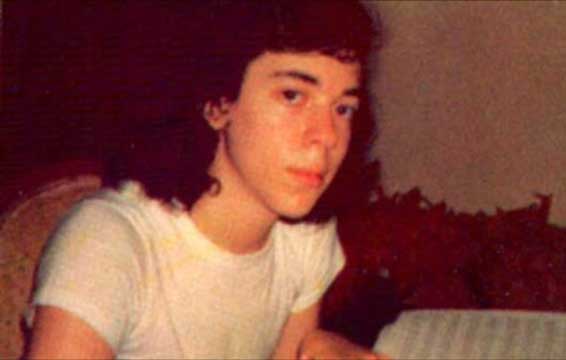

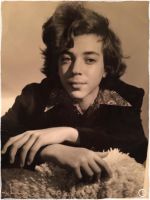
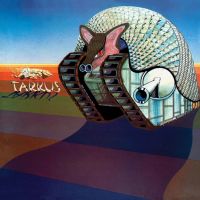
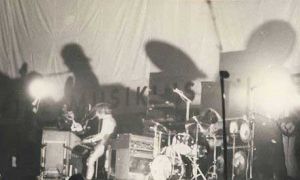
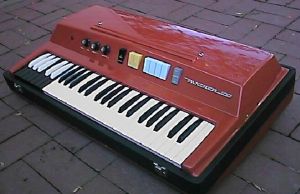
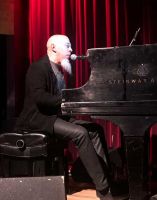
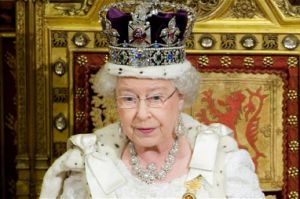
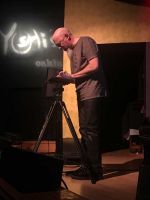

 Other Related News
Other Related News









